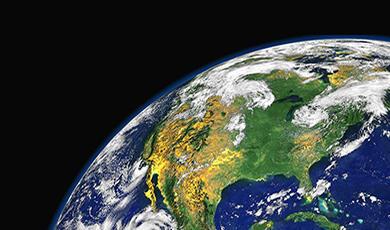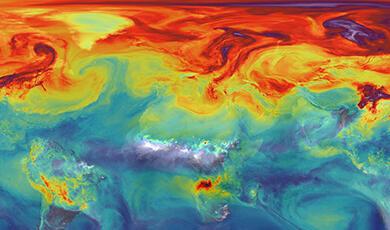Press release: The Ocean Physics Behind Net Zero

Explains how heat energy from global warming ‘accumulates in the oceans’ and this is why it isn’t enough to stabilize atmospheric concentrations of greenhouse gases
To halt warming, carbon dioxide levels need to decline. How fast is still an open question
"We won't really know for sure what it will take to halt the warming until we significantly reduce the rate of increase in greenhouse gases"
Embargo: Tuesday 31 Jan, 7pm
We would like to invite you to a lecture by Professor Myles Allen, on The Ocean Physics Behind Net Zero on Tuesday. In this lecture, Professor Allen will explore the effects of climate change on the ocean.
In lecture, Allen will explore how global warming both goes into the atmosphere, and into the ocean; and how stabilising concentrations of greenhouse gases in the atmosphere would only slow, not stop, global warming, “temperatures would continue to rise by about 0.3% per year – at 1.5°C, that means one fifth of the current rate of warming.”
“The additional energy accumulating in our climate system as a result of past greenhouse gas emissions dwarfs the energy we actually produce from burning fossil fuels. And don’t forget there is more than twice as much again being radiated away because of past warming."
“The vast bulk of this heat energy accumulates in the oceans, some on land, some is taken up in melting ice, only a very small fraction in the atmosphere, because the heat capacity of air is so much smaller than the heat capacity of water. But most of it ends up in the near-surface ocean: half in the top 700 metres, even though these comprise only one-sixth of the oceans’ volume. We’ve only been able to monitor this accumulation of heat in the oceans quite recently, thanks to initiatives like the Argo float programme, so estimates of global ocean heat content trends back in the 1980s are very uncertain. But the trend since 2000 is rock-solid, and matches the energy imbalance we can detect from satellites very well, so we’re able to “close the energy budget”. And it’s clear that energy is accumulating in the climate system at a rate of 0.75 Watts per square metre, or 12 ZettaJoules per year, which is over 20x world primary energy production.”
“We also have to recognise that we can model until we are blue in the face, but we won’t really know for sure what it will take to halt the warming until we significantly reduce the rate of increase in greenhouse gas concentrations: which means big cuts in emissions,” Allen will say.
ENDS
Notes to Editors
You can sign up to watch the hybrid lecture online or in person; or email us for an embargoed transcript or speak to Professor Allen: l.graves@gresham.ac.uk / 07799 738 439


 Login
Login





